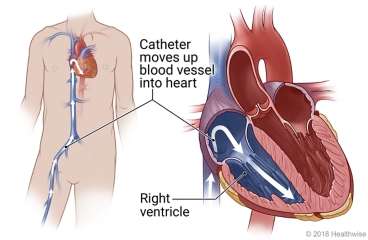
Your Recovery
A leadless pacemaker is a small, battery-powered device. It sends mild, painless electrical signals to your heart. This keeps it beating normally. Your doctor used a catheter to place the pacemaker inside your heart.
Your groin may have a bruise and feel sore for a few days. You can do light activities around the house. But don't do anything strenuous for several days.
You'll need to take steps to safely use electric devices. Some of these devices can stop your pacemaker from working right for a short time. Check with your doctor about what to avoid and what to keep a short distance away from your pacemaker. For example, you will need to stay away from things with strong magnetic and electrical fields. An example is an electronic body fat scale. You can use a cell phone and other wireless devices, but keep them at least 6 inches away from your chest. Many household and office electronics don't affect a pacemaker.
This care sheet gives you a general idea about how long it will take for you to recover. But each person recovers at a different pace. Follow the steps below to get better as quickly as possible.
How can you care for yourself at home?
 Activity
Activity
- If the doctor gave you a sedative:
- For 24 hours, don't do anything that requires attention to detail, such as going to work, making important decisions, or signing any legal documents. It takes time for the medicine's effects to completely wear off.
- For your safety, do not drive or operate any machinery that could be dangerous. Wait until the medicine wears off and you can think clearly and react easily.
- Do not do strenuous exercise and do not lift, pull, or push anything heavy until your doctor says it is okay. This may be for several days. You can walk around the house and do light activity, such as cooking.
- Try not to walk up stairs for the first couple of days.
 Diet
Diet
- If you had dye injected, drink plenty of fluids to help your body flush out the dye. If you have kidney, heart, or liver disease and have to limit fluids, talk with your doctor before you increase the amount of fluids you drink.
 Medicines
Medicines
- Your doctor will tell you if and when you can restart your medicines. You will also be given instructions about taking any new medicines.
- If you stopped taking aspirin or some other blood thinner, your doctor will tell you when to start taking it again.
- Call your doctor if you think you are having a problem with your medicine.
 Care of the catheter site
Care of the catheter site
- For 1 or 2 days, keep a bandage over the spot where the catheter was inserted. The bandage probably will fall off in this time.
- Put ice or a cold pack on the area for 10 to 20 minutes at a time to help with soreness or swelling. Put a thin cloth between the ice and your skin.
- You may shower 24 to 48 hours after the procedure, if your doctor okays it. Pat the incision dry.
- Do not soak the catheter site until it is healed. Don't take a bath for 1 week, or until your doctor tells you it is okay.
- Watch for bleeding from the site. A small amount of blood (up to the size of a quarter) on the bandage can be normal.
- If you are bleeding, lie down and press on the area for 15 minutes to try to make it stop. If the bleeding does not stop, call your doctor or seek immediate medical care.
 Other instructions
Other instructions
- Keep a medical ID card with you at all times that says you have a pacemaker. The card should include the manufacturer and model information.
- Wear medical alert jewelry stating that you have a pacemaker. You can buy this at most drugstores.
- Tell all of your doctors, dentists, and other health professionals that you have a pacemaker before you have any test, procedure, or surgery.
- Ask your doctor for a list of electric devices that you might need to keep a short distance from your pacemaker.
- Check your pulse as directed by your doctor.
- Have your pacemaker checked as often as your doctor recommends. In some cases, this may be done from your home. Your doctor will give you instructions about how to do this.
Follow-up care is a key part of your treatment and safety. Be sure to make and go to all appointments, and call your doctor if you are having problems. It's also a good idea to know your test results and keep a list of the medicines you take.
When should you call for help?
Call 911 anytime you think you may need emergency care. For example, call if:
- You passed out (lost consciousness).
- You have trouble breathing.
Call your doctor now or seek immediate medical care if:
- You are bleeding from the area where the catheter was put in your blood vessel.
- You have a fast-growing, painful lump at the catheter site.
- You have symptoms of infection, such as:
- Increased pain, swelling, warmth, or redness.
- Red streaks leading from the area.
- Pus draining from the area.
- A fever.
- Your leg looks blue or feels cold, numb, or tingly.
- You are dizzy or lightheaded, or you feel like you may faint.
Watch closely for changes in your health, and be sure to contact your doctor if you have problems.
Current as of: October 2, 2025
Author: Ignite Healthwise, LLC Staff
Clinical Review Board
All Ignite Healthwise, LLC education is reviewed by a team that includes physicians, nurses, advanced practitioners, registered dieticians, and other healthcare professionals.

